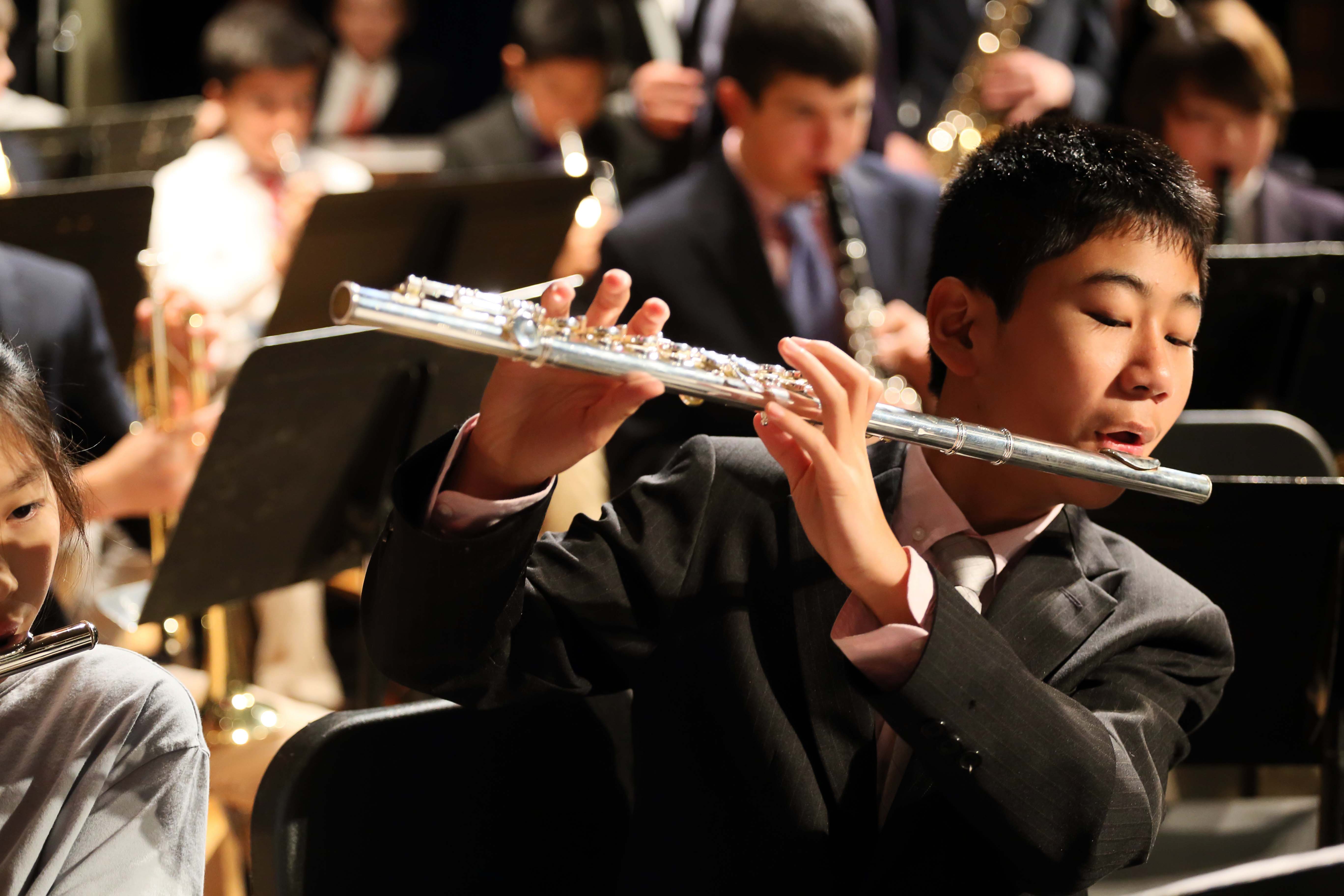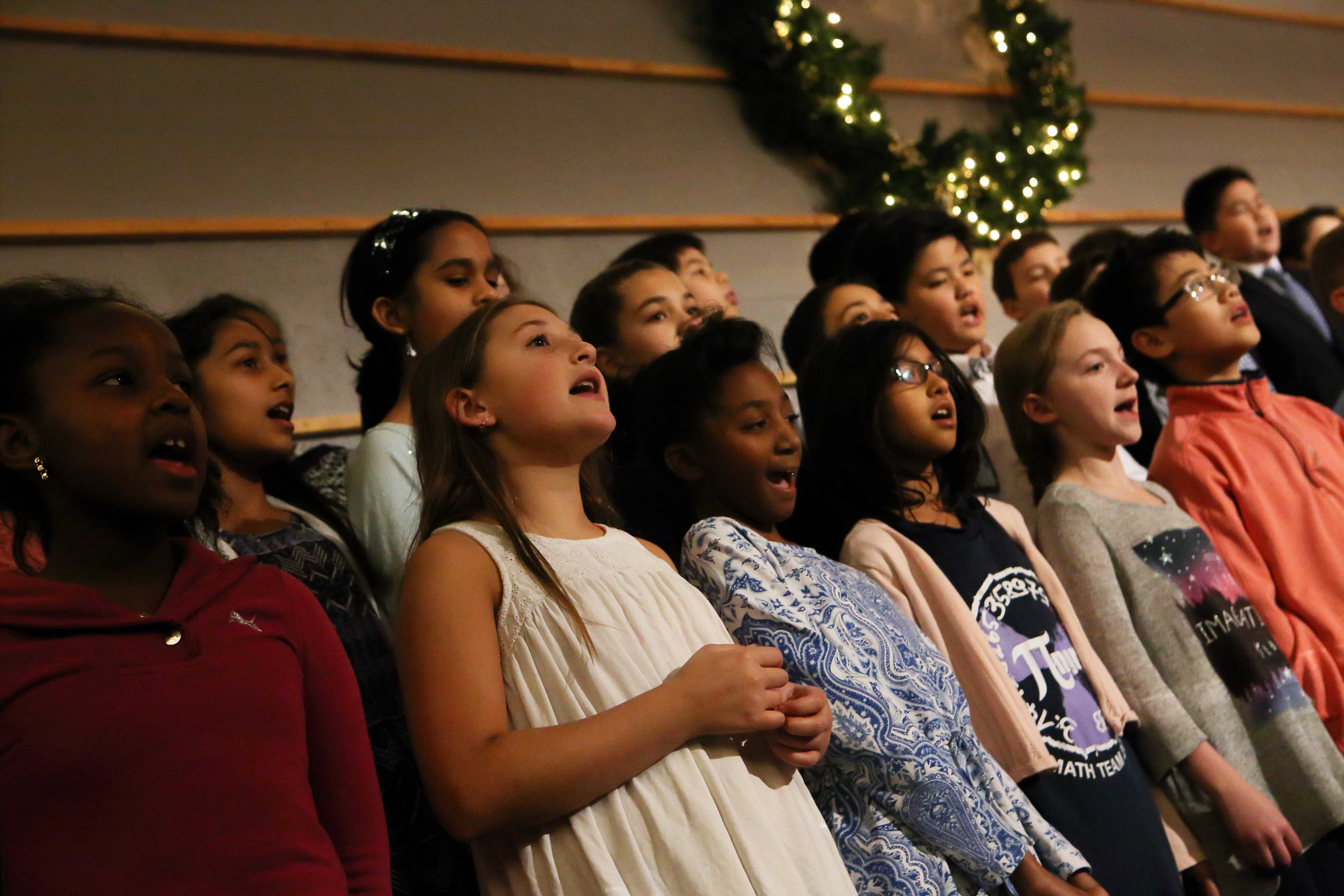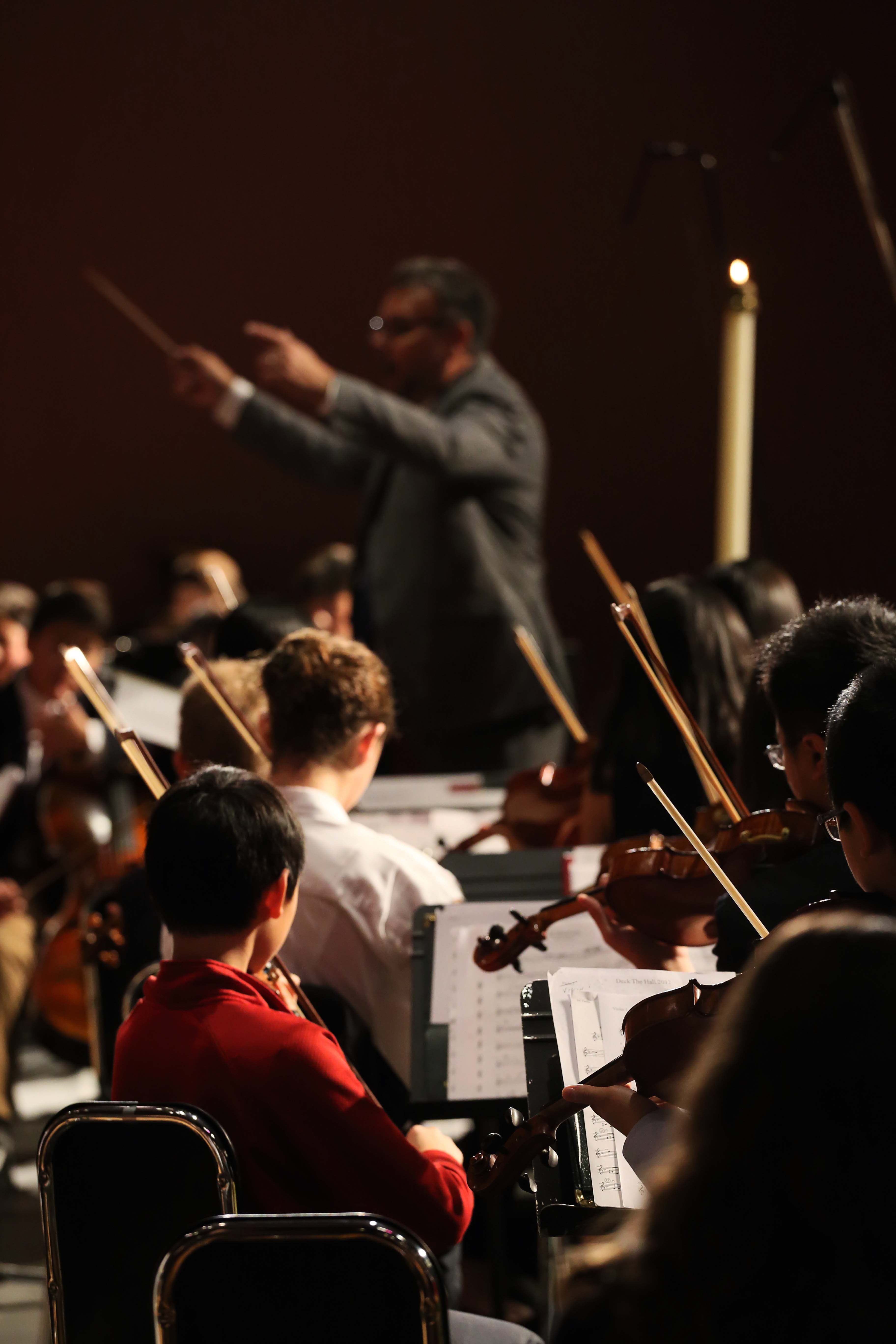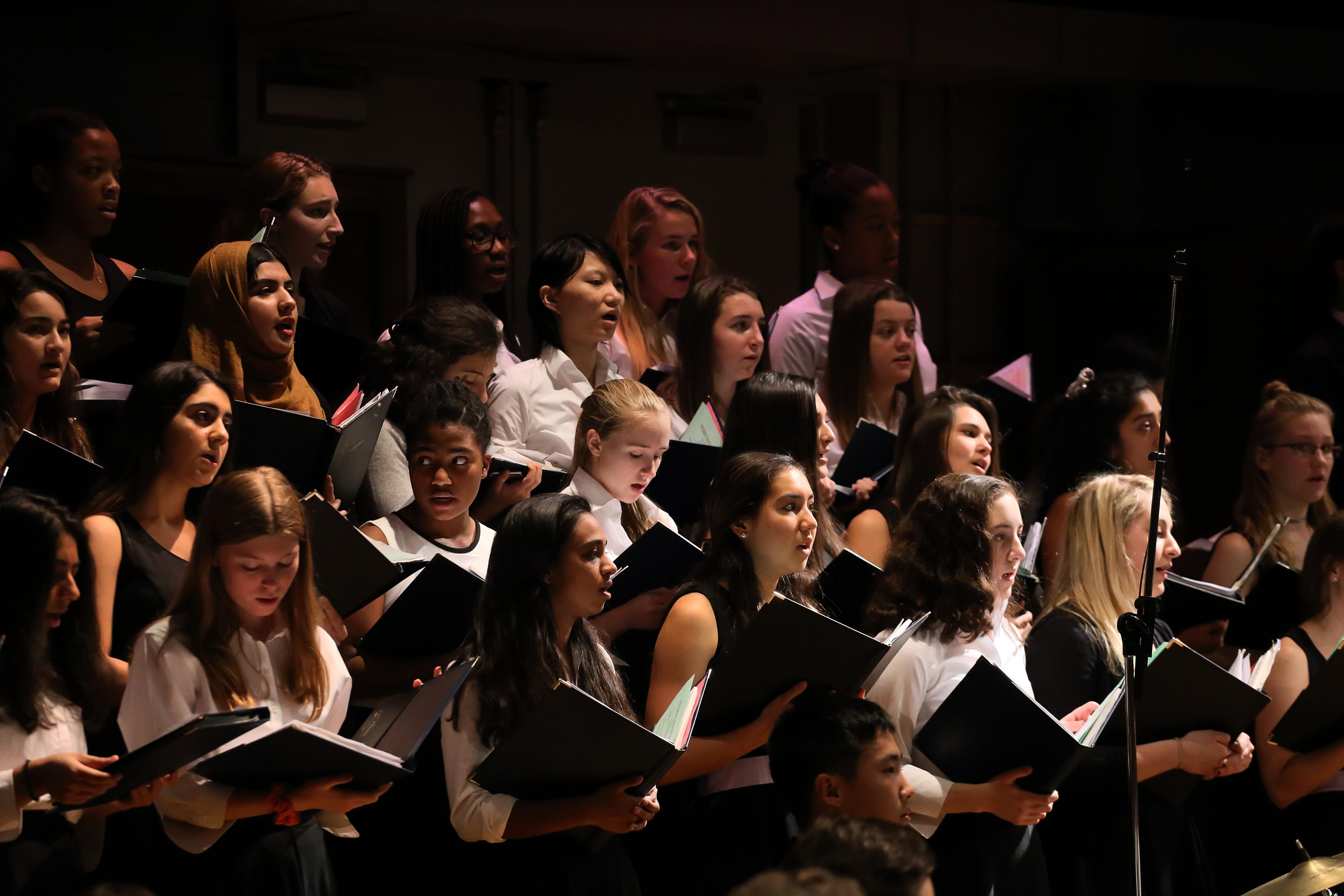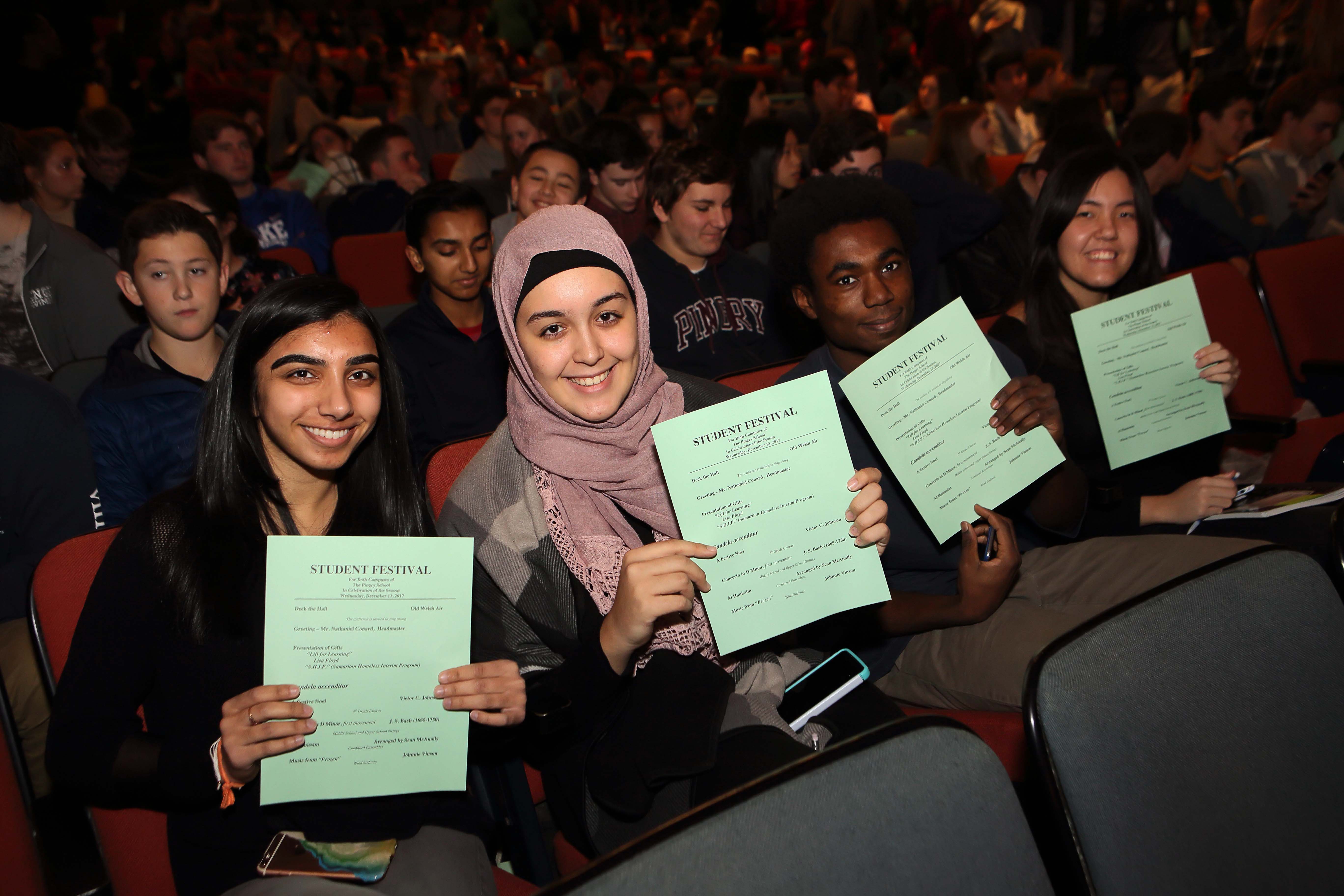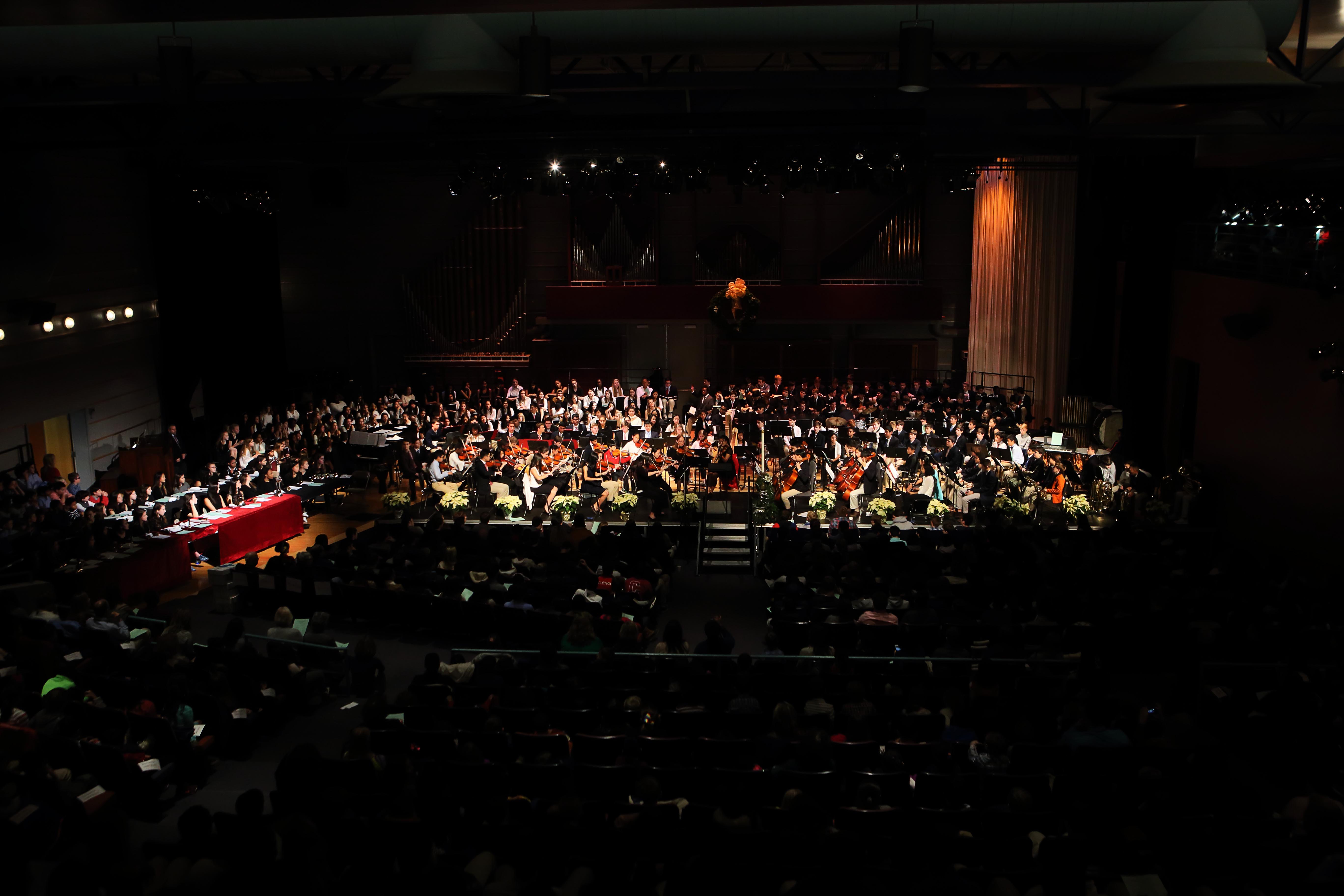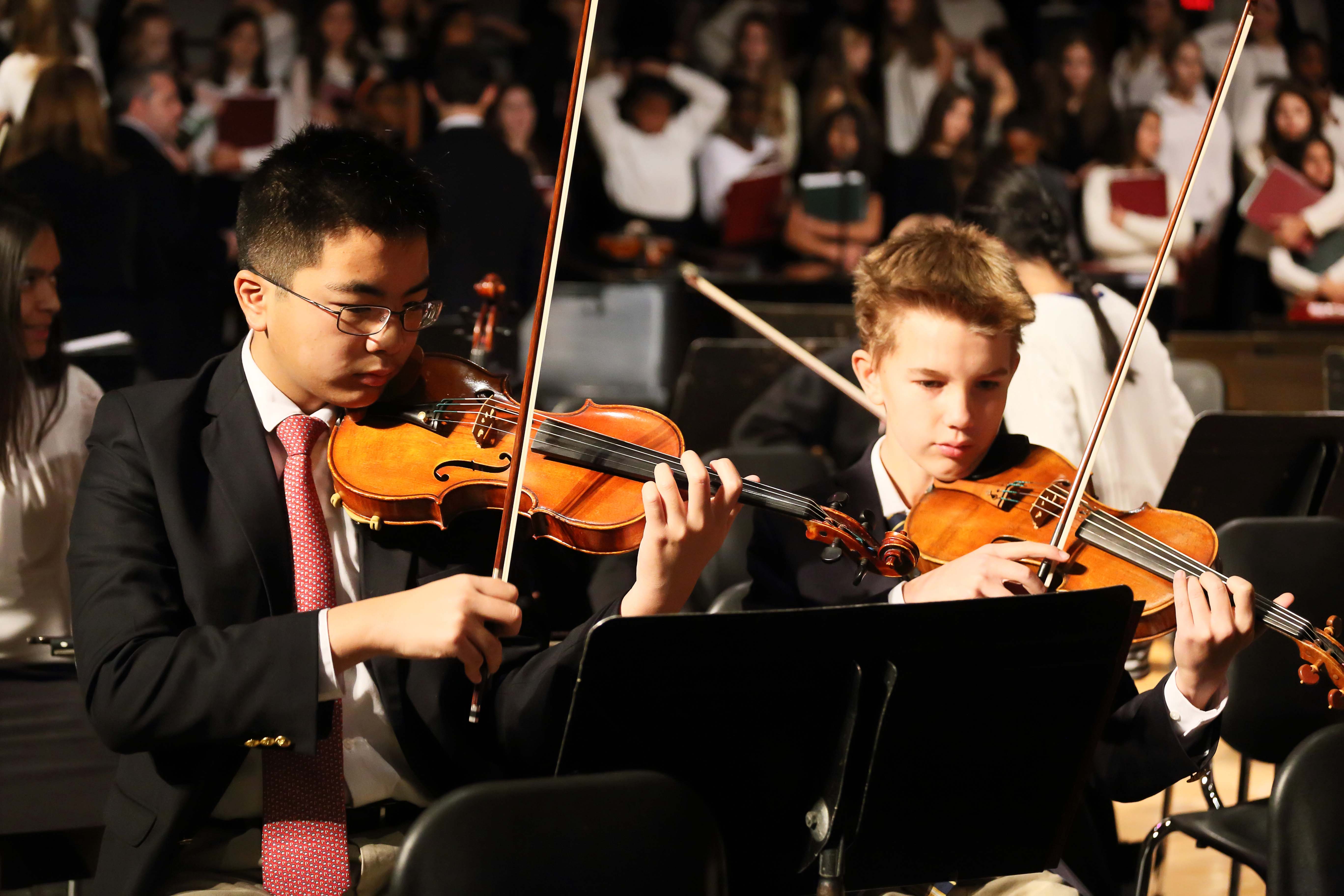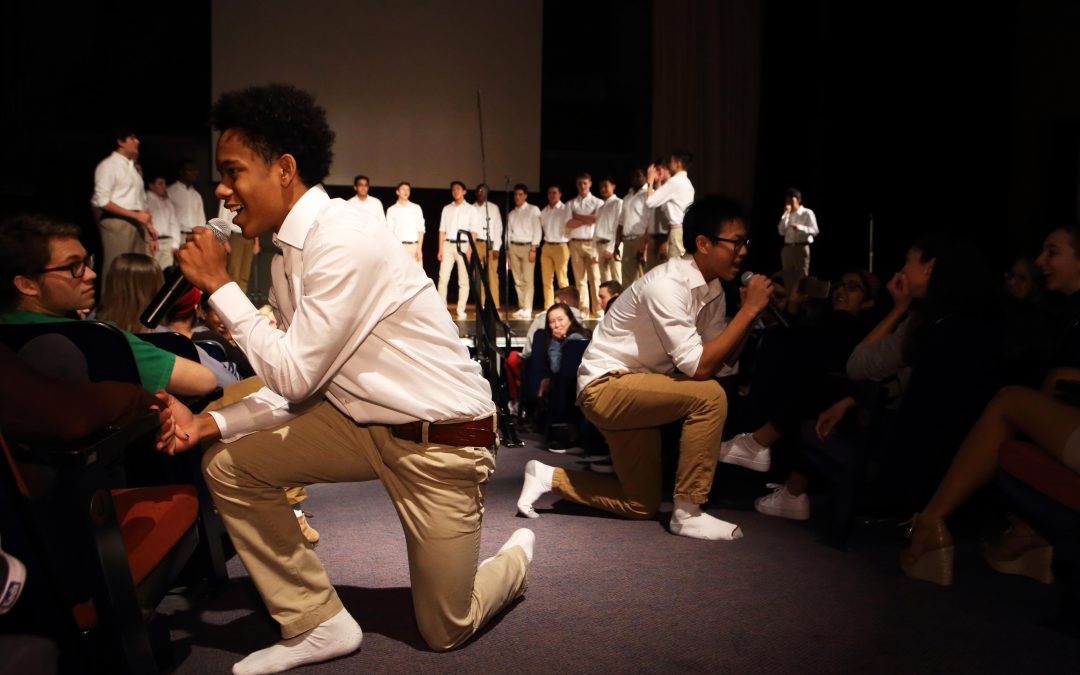
Dec 24, 2017 | Arts, Eva Schiller, School News
By Eva Schiller ’21
On November 21, students and faculty members took a break from their busy school day to enjoy the Buttondowns Assembly, a highly anticipated annual event presented by the Buttondowns, Pingry’s all-male acapella group led by president Jonathan Huang (VI).
The annual Buttondowns movie opened the show. It was filmed by Ian Dugan (V) and sparked the laughter of many students. The movie’s theme was inspired by Agatha Christie’s famous murder mystery, And Then There Were None. In the movie, the Buttondowns are eliminated one by one, starting with the freshmen. In a twist ending, it was revealed that the freshmen are the murderers, with the moral being to “never mess with freshmen.”
The movie ended with the tradition of the Buttondowns entering Hauser Auditorium to the song, “We Will Rock You,” dressed in the their recognizable outfits: khakis and white button-down shirts. They then began singing.
The first song they performed was “Sunday Candy” by Donnie Trumpet and the Social Experiment, a popular group which features Chance the Rapper. The Buttondowns’ rendition featured soloists Nolan Baynes (III) and James Wang (IV).
“This solo was a perfect fit for me because ‘Sunday Candy’ is one of my favorite songs,” said Baynes, “and to perform it with one of my friends since sixth grade, James Wang, is a dream come true.” This song, along with others, was even more memorable as the soloists interacted with the audience, occasionally kneeling down and serenading audience members in aisle seats.
The next song was “Give Me Love” by Ed Sheeran, with soloists Ore Shote (III) and Jared Tiggs (VI). “Looking back on the assembly, there are things I would have done differently, but I think that everything went better than was planned,” said Shote of the performance.
“Give Me Love” was followed by “Just the Way You Are” by Billy Joel, with soloists Rajeev Doraswamy (V) and Ian Dugan (V). After the song, the Buttondowns underclassmen thanked president Jonathan Huang for his contributions to the group. Huang soloed in the final song, “The Death of a Bachelor” by Panic! At the Disco, to end the assembly.
Reminiscing on his years as a Buttondown, Huang had much to say. After the assembly, he said, “As far as today’s performance, I went through many different emotions. I felt a rush of excitement running onto stage, and it was bittersweet singing the last lines of ‘Death of a Bachelor.’ To the Pingry community: Thank you for being a part of my most special moments at Pingry. I love all of you.”
Huang also thanked Dr. Moore “for being the backbone of the group. None of the music would have been made without his endless guidance and support.”
He also noted that “The time Ian Dugan spent on shooting and editing the movie is unbelievable, and I am very grateful for his amazing work.”
The Buttondowns received fullhearted support and positive feedback from the Pingry community both during and after their performance. “The audience was incredible, and all the Buttondowns felt wonderful hearing the applause and kind words after the performance,” said Huang.

Dec 24, 2017 | Arts, Columns, Media
By Vicky Chen (V)
Named the Best Picture of 2017 by L.A. Critics, Luca Guadagnino’s controversial Call Me By Your Name explores the harrowing coming-of-age experiences of first love and identity. The movie stars Timothee Chalamet as 17-year-old Italian-American Elio and features his time spent one summer at his family’s villa in northern Italy. Armie Hammer is introduced as the early-20s, charming, all-American Oliver, who has come to the villa to study with Elio’s father, a professor of Greco-Roman culture.
The film explores the tumbling romance that develops slowly between Elio and Oliver, navigating the turns of life that summer throws at them. Elio spends his summer days playing and composing music for the piano and guitar, biking around the stunning scenery of Crema, Italy, and reading books in the sun. Oliver proves to be a social butterfly in this new community; he wins the affection of Elio’s parents quickly, as well as the admiration of all the girls. Elio watches Oliver from the side, quietly keeping to himself. Their relationship begins to slowly develop from their furtive dinner-table interactions into something much more.
As the story is told from Elio’s point of view, his crush on Oliver begins to escalate and reveal more about his character. Chalamet portrays his teenage character perfectly, allowing the audience insight into the vulnerability of discovering one’s identity. The audience is there at every step as Elio explores his final summer before adulthood. He struggles with his sexual identity, maintaining a sexual but emotionless relationship with a girl around the neighborhood, all while constantly keeping his eye on Oliver. Even though the connection between Elio and Oliver is apparent from the start, both of them work hard to maintain a cold distance between themselves. The movie comes to a climax towards the end, when the tension between the two is finally acknowledged, and they begin an electrifying, mesmerizing, and short-lived hidden relationship.
The realistic portrayal and attention to detail in this film makes it extraordinarily special. Guadagnino maneuvers the sluggish summer days gracefully, depicting a lush and beautiful setting that envelops the viewer in its authenticity. As Elio and Oliver’s relationship becomes deeper, their interactions become increasingly awkward. However, it is not bad acting that creates this tension between the characters—their interactions are written to be painfully realistic in their long pauses and flustered statements. Guadagnino perfectly portrays the teenage clumsiness of navigating a first love.
Additionally, Guadagnino manages to integrate every aspect of an idyllic summer into the background of the movie. Using an emphasis on nature and a nonchalant pace, Guadagnino is able to replicate an end-of-summer sense of drowsiness and fulfillment. His visual choices and cinematography enable the viewer to feel present in the scene.
The movie ends with an incredibly intimate scene as Elio sits in front of the fireplace, grief-stricken with emotion after learning over the phone about Oliver’s engagement. Everything around him is dynamic, from the flames into which he is staring to the people hustling in the background. As the eerily powerful “Videos of Gideon” by Sufjan Stevens plays softly, tears slowly fall down Elio’s face over the course of three minutes. This finale reiterates the rocky journey of adolescence and emphasizes the impact of not only a first great love, but a first great loss.
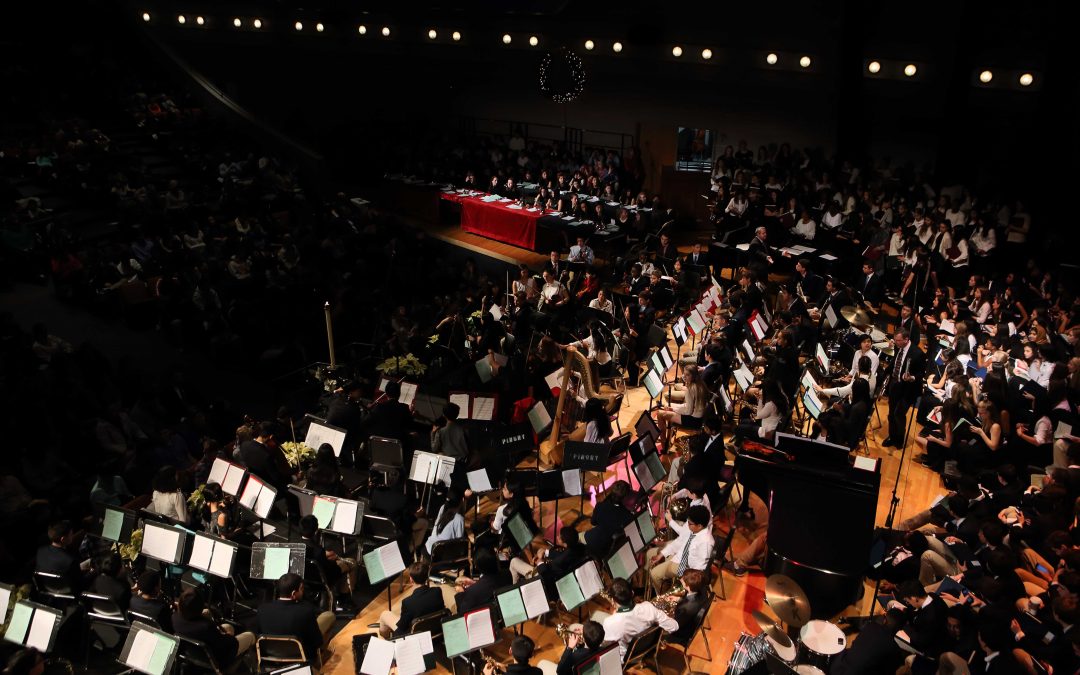
Dec 24, 2017 | Arts, School News
By Udochi Emanghara (V)
On December 13, 2017, Pingry hosted the annual Winter Festival, the only time that the Upper School and Lower School come together for one event. This festival has been a tradition for over 100 years. It celebrates the accomplishments of the orchestra, men’s and women’s glee club, Middle School band, strings ensemble, hand bells, and the music direc tors by showcasing their work to the entire school. These efforts, coupled with the festivities and the environment, make the concert an important part of the school year in which over half the school participates.
The event opened with “Deck the Halls” conducted by Mr. Tom Berdos, the Lower School music instructor. Headmaster Mr. Nathaniel Conard then delivered an introductory speech, which focused on the importance of community and the coming together of the two campuses. Next came the presenting of gifts to Ms. Lisa Floyd, the leader of Lift for Learning, an organization that gives food and clothes to impoverished people. Afterwards, the festival commenced with the tradition of Candela Accreditor (the lighting of the candle) by kindergartener Jake Fey and Student Body President Michael Weber (VI).
Highlights of the concert included “A Festive Noel” performed by the fifth grade chorus. As the fifth graders are the only group from the Lower School that performs at the festival, their contribution was highly anticipated and they delivered. In addition, it evoked nostalgia in people who were once a part of that group.
Alyssa Chen (VI) said, “Watching the fifth graders filled me with warmth.” Another highlight was “Al Hanissim,” a Jewish prayer performed by the orchestra, middle school chorus, and upper school glee club with solos from Alyssa Chen (VI) and Hugh Zhang (III). This piece is a chorus favorite due to its lively beat. Lastly, the middle school percussion ensemble performed “Kishmar,” a take on Led Zeppelin’s hit performed by the middle school percussion ensemble. This was the debut of the group and they instantly became a crowd favorite. The concert concluded with a rousing rendition of “Twelve Days of Christmas.”
While all of the selections were amazing, the words of Mr. Conard ring true: the event was truly about bringing the community together. Maya Huffman (VI) and Melissa Tungare (VI) recall their first times seeing the concert. Huffman, who came to Pingry as a kindergartner, said that she was “always excited for the concert as a lower school member.” Similarly, Tungare has been going to the concert for over ten years with her big brother and has witnessed multiple performances. As a current Balladeer, she said that “it is nice to now be a part of the concert.” Over the years, Pingry has changed drastically; the change in campus (moving from Hillside), the admittance of females into the school, the construction of the Middle School, and much more showcase the development of Pingry as a school. Similarly, this concert has gone through its changes as well; the one thing that remains the same is the spirit of the concert. In the words of Mr. Miller Bugliari, “the whole sentiment from a long time ago is still present.”
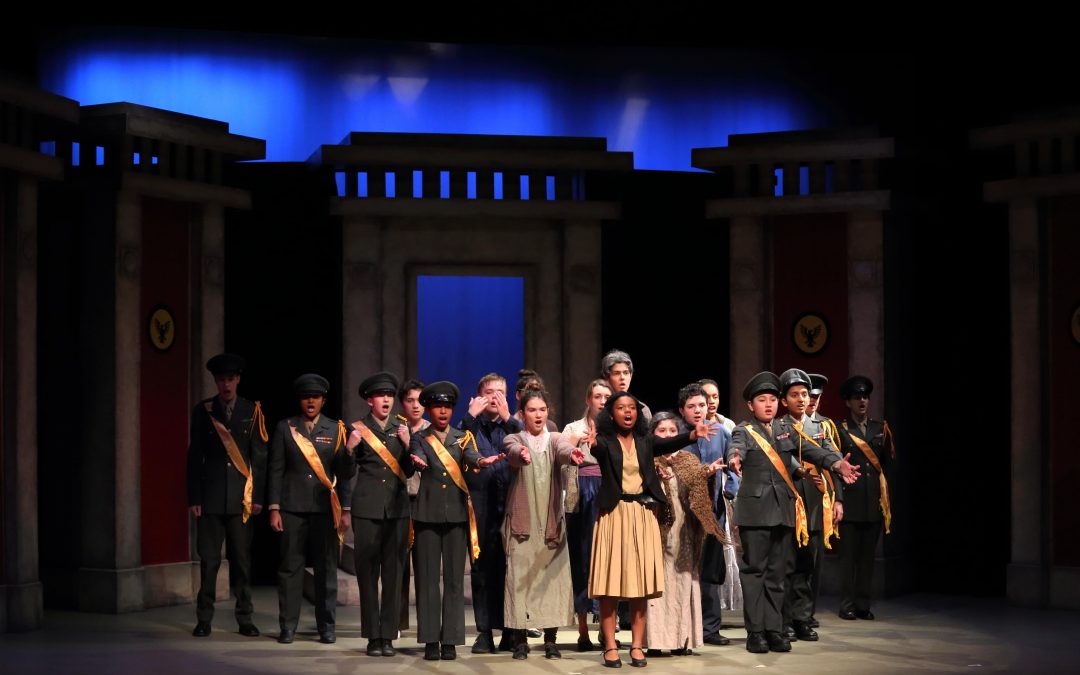
Dec 24, 2017 | Arts, School News
By Allison Verdesca ’18
On November 9, 10, and 11, the Drama Department performed its annual fall play Antigone by Sophocles. The Greek tragedy describes life in the city of Thebes under the domineering rule of King Creon. A part of Pingry’s freshman English curriculum, the play examines issues of divine law versus societal law and the use and abuse of political power. The entire freshman class, along with special needs students from Montgomery Academy in Basking Ridge, watched the play’s dress rehearsal.
The play follows a young girl named Antigone (Meghan Salamon, VI), whose two brothers turn on each other and cause a civil war. After they kill each other in battle, the newly crowned King Creon (Lucas Vazquez, V) advocates for the burial of only one of the brothers. Fearing the retribution of the gods, Antigone sets out to bury her other brother, despite the threats of Creon and warnings from her sister Ismene (Alison Verdesca, VI). Incensed by Antigone’s disobedience, Creon demands that Antigone be buried alive. Creon’s son Haemon (Giancarlo Castillo, VI), who is engaged to Antigone, tries to change his father’s mind but fails. After the blind seer Tiresias (Megan Pan, VI) predicts that Creon’s stubbornness will lead to disaster, Creon reconsiders. When he reaches the tomb, Antigone has hanged herself and Haemon, after attempting to kill Creon and failing, kills himself as well. When Eurydice (Sara Donovan, VI), Creon’s wife, hears the news, she also commits suicide, leaving Creon a lonely and broken man. In the play, the Army Chorus and the Citizen’s Chorus narrate the story and comment on the plot.
Directed by Mrs. Meaghan Singer, Pingry’s production put a new spin on this classic Greek tale by setting it in a dystopian future. Mrs. Singer said of the show’s setting, “I heard Antigone’s words ringing in my ears — ‘these citizens here would all agree…if their lips weren’t locked in fear’ — and I knew immediately that my version of Antigone would be set in a totalitarian state, a military regime, and my chorus would be an army, not unlike that of Kim Jong Un’s, or Stalin’s, or Hitler’s.”
This was Mrs. Singer’s first year directing the fall play, though she assisted Mr. Romano in the past. Of the Drama Department, she said, “I love working in such a supportive and giving environment. It is a true pleasure.”
In addition to having Ms. Singer as a new director, Antigone had a new master carpenter, Mr. Christopher Abbott. Mr. Abbott worked with Mrs. Jane Asch to create a futuristic set inspired by the play’s dystopian world. Another new faculty member, Mr. Alan Van Antwerp, served as technical director as well as lighting designer. Lindsay Cheng (IV), Jackson Lubke (V), and Ouarida Benatia (VI) served as the play’s stage managers.
Meghan Salamon, who played the titular role, said her favorite memory was “spending time with all the seniors during the morning of our last show.” Involved with drama since her freshman year, Meghan was eager to step into the role of Antigone for her final fall production. “Antigone is smart and dedicated, and she throws herself into what she thinks is right. I really admire that about her,” Salamon said. “She definitely expresses how she feels and she lets people know what she stands for.”






